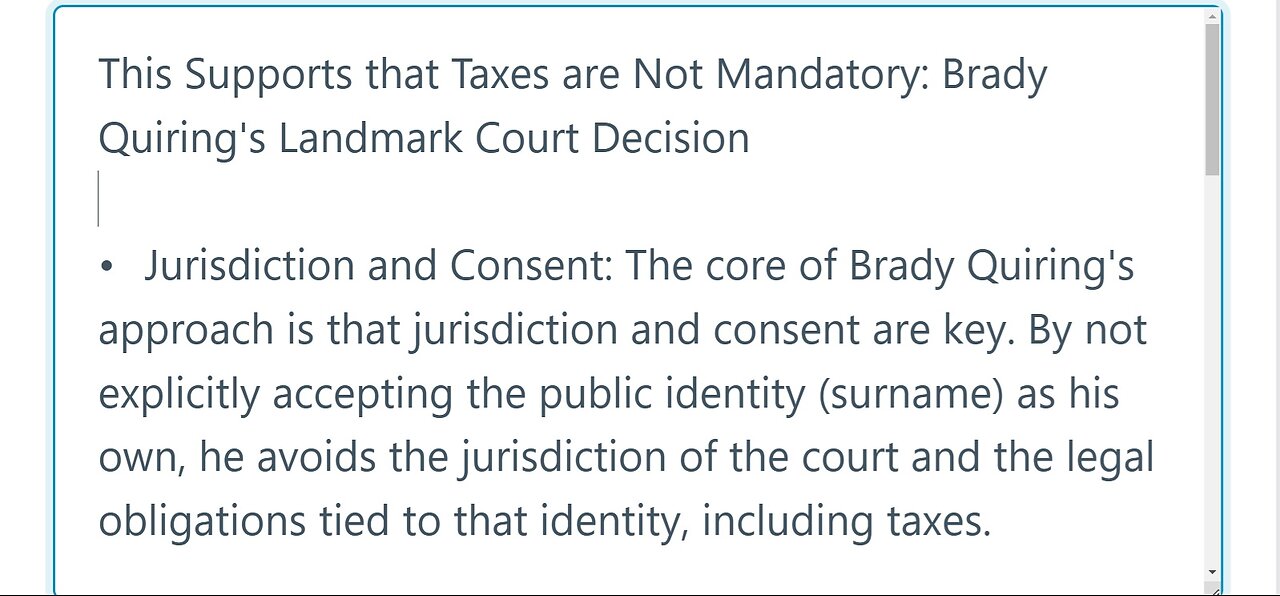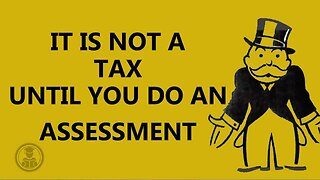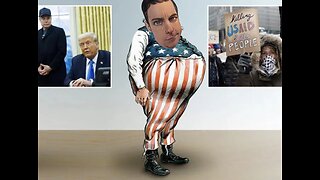Premium Only Content

This Supports that Taxes are Not Mandatory: Brady Quiring's Landmark Court Decision
This Supports that Taxes are Not Mandatory: Brady Quiring's Landmark Court Decision
• Jurisdiction and Consent: The core of Brady Quiring's approach is that jurisdiction and consent are key. By not explicitly accepting the public identity (surname) as his own, he avoids the jurisdiction of the court and the legal obligations tied to that identity, including taxes.
• Trust and Ownership: The legal identity and the associated obligations, such as taxes, are held in trust by the Crown. If an individual does not claim ownership of that identity (and therefore the obligations), the government cannot enforce those obligations, making taxes effectively voluntary for those who understand and apply this logic.
• Successful Legal Strategy: Brady's success in having cases dismissed by applying this logic suggests that the system recognizes the validity of these arguments when properly presented. This success indicates that the enforcement of taxes and other legal obligations may rely more on individuals' acceptance of certain roles and identities than on absolute legal mandates.
This transcript illustrates how Brady strategically navigates the legal system by understanding the distinction between public and private identities, challenging the jurisdiction, and asserting his rights, which aligns with the concept that taxes are not inherently mandatory.
-
 11:58
11:58
We The People - Constitutional Conventions
22 hours agoJEAN KEATING LEGACY CLASS 1099 OID REMASTERED
258 -
 LIVE
LIVE
Graham Allen
3 hours agoEXPOSED! JFK, 9/11, And Epstein Files WILL BE RELEASED! + FEMA Inspector General FIRED!
5,417 watching -
![REP LUNA SAYS THERE WAS A SECOND JFK SHOOTER [EP 4438-8AM]](https://1a-1791.com/video/fwe1/67/s8/1/z/2/f/M/z2fMx.0kob-small-REP-LUNA-SAYS-THERE-WAS-A-S.jpg) LIVE
LIVE
The Pete Santilli Show
16 hours agoREP LUNA SAYS THERE WAS A SECOND JFK SHOOTER [EP 4438-8AM]
1,394 watching -
 LIVE
LIVE
Jeff Ahern
1 hour agoNever Woke Wednesday with Jeff Ahern
781 watching -
 LIVE
LIVE
Vigilant News Network
19 hours agoTrump Admin Strikes Back at Deep State Operatives | The Daily Dose
1,238 watching -
 1:27:30
1:27:30
Game On!
15 hours ago $1.95 earnedSuper Bowl champion Kellen Moore signs with the Saints!
16.2K1 -
 20:41
20:41
Producer Michael
20 hours agoMEET THE MAN WHO BUYS THE WORLDS MOST EXPENSIVE DIAMONDS
43.7K9 -
 14:19
14:19
Cooking with Gruel
16 hours agoBaking Soda and Beef
50K6 -
 9:41
9:41
Gun Owners Of America
1 day agoATF Is Using Facial Recognition AI To Track Gun Owners
43.9K14 -
 16:01
16:01
Clownfish TV
12 hours agoDisney Officially ENDS Reimagine Tomorrow DEI Program?!
29K5